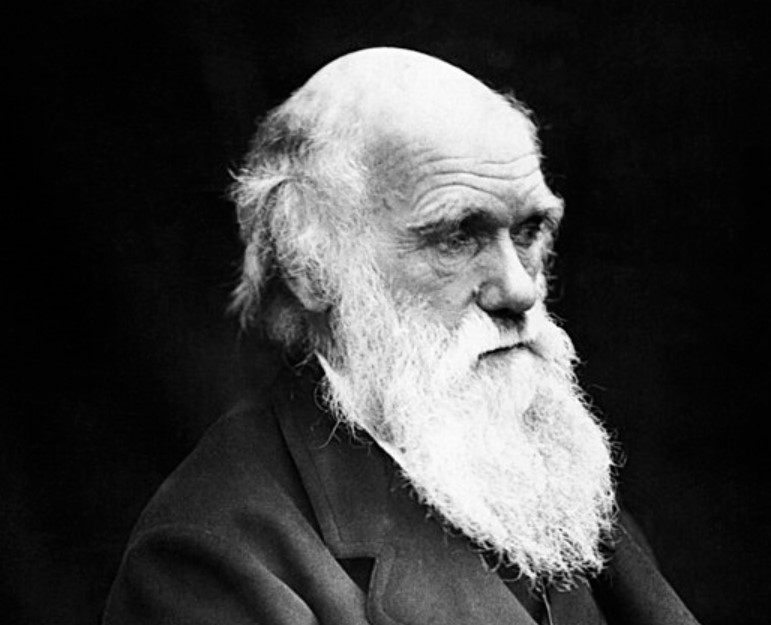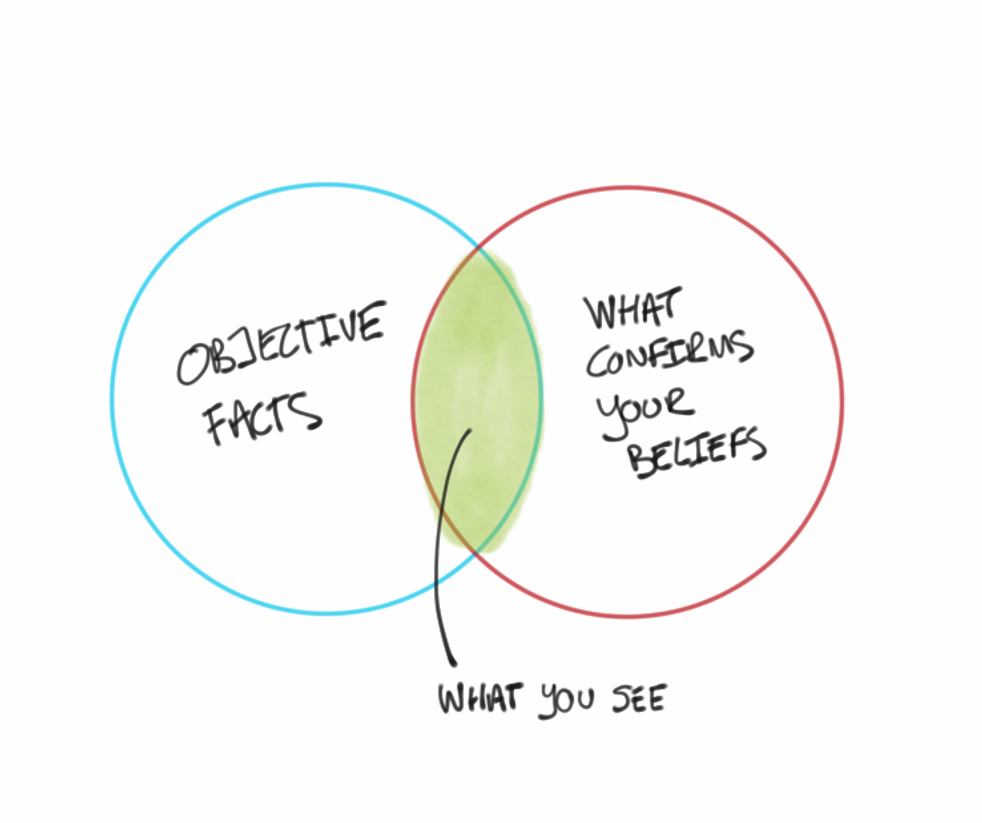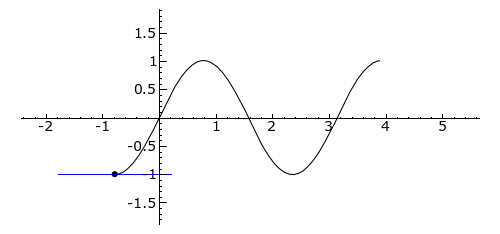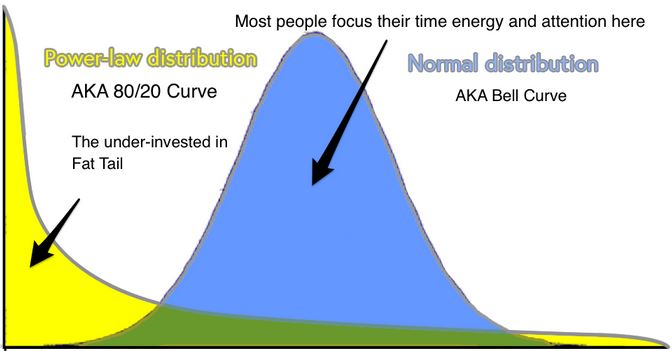Why You Should Embrace Anomalies
The Incredible Value Of Disconfirming Evidence
The Context Of Why You Should Embrace Anomalies
There are two fundamental reasons why you should embrace anomalies, and they are both related to your long term health wealth and happiness:
- The identification of new and unrecognised opportunities.
- The avoidance of ignored risk and disaster.
An anomaly is a deviation from what is expected or commonly regarded as the norm. It often appears as an unexpected observation that defies conventional wisdom or established theories. It is frequently regarded as an abberation, a nuisance or an inconvenient interruption to a long cherished assumption.
It is for this reason that new and unrecognised opportunities are often rejected.
The ones that got away
One of the most well know examples of this is the Decca record executive who refused to sign the Beatles in 1962 because “...guitar groups are on the way out...”
Another example occured early in my career as a salesman for what used to be Gestetner Duplicators who had pioneered a process of creating short run copies of documents with their own proprietry printing technology.
A few years before I joined Gestetners they were approached by Xerox, who were the first to manufacture xerographic plain-paper copiers, with a view to a joint venture.
In their infinite wisdom, the directors of Gestetner rejected the offer on the basis that the idea of a plain paper photo copier would never take off. It did and there proved to be a massive demand for plain paper photocopiers in the UK and Gestetner [and their salesforce!] took a hammering!
The devastating effect of Black Swans
Nassim Nicholas Taleb
the mathematical statistician, former option trader, risk analyst, and
writer brought the concept of Black Swans to popular attention in his book, "The Black Swan: The Impact Of The Highly Improbable". These are anomalies with
disastrous consequences.
Taleb describes black swans as an event that is so rare that it is not on the radar to extent that even the possibility that it might occur is not known, yet when it does occur the impact is devastating and catastrophic. A recent example was the global Covid pandemic. Here are some further examples.
Why You Should Embrace Anomalies
Why You Won't Because Of Confirmation Bias
Is Your Desire To Be Right Greater Than Your Desire To Have Been Right?
The most fundamental factor behind why you should embrace anomalies but most likely won't is confirmation bias.
Put simply, in the pursuit of knowledge and understanding, you see what you expect to see.
Pattern recognition vs. disconfirming evidence
The human brain naturally gravitates toward patterns and confirmation because it is wired to seek coherence and consistency. This happens because we are hardwired to use shortcuts, known as heuristics, to reduce the amount of time and mental energy it takes to collect, process and evaluate information.
It has been suggested by evolutionary scientists that our use of heuristics is based on survival instincts.
Psychologists have suggested that the use of confirmation bias is to do with self esteem as it can be very threatening to your identity and sense of self to discover that your deeply held views are disproved by the evidence you are assessing.
Confronted with evidence that a long held and deeply felt belief is inaccurate or false can be the underlying motivating influence for use of confirmation bias. As a consequence of this you will tend to look for information that supports rather than disproves your existing beliefs.
But regardless of the cause, you are most likely to follow the patterns that the human brain has adapted over the last 100,000 years and to take the line of least resistance.
How you will apply confirmation bias
Confirmation bias occurs when you:
- Select and act upon information that confirms your existing beliefs, prejudices, preferences or hypotheses
- Give more weight to evidence that supports your beliefs and diminishes the evidence that disproves it
- Recall information selectively
- Interpret information with a preferential bias
Confirmation bias will tend to be stronger with emotionally charged issues and where you hold deeply entrenched beliefs.
Twentieth century philosophers W.V.Quine and J.S.Ullian noted the important distinction between being right and wanting to have been right in their classic "The Web Of Belief" and they observed that:
"The desire to be right and the desire to have been right are two desires, and the sooner we separate them the better off we are.
The desire to be right is the thirst for truth. On all counts, both practical and theoretical, there is nothing but good to be said for it.
The desire to have been right, on the other hand, is the pride that
goeth before a fall. It stands in the way of our seeing we were wrong,
and thus blocks the progress of our knowledge."
How To Spot The Anomalies - Key Tips
Anomalies Are Like A Glitch In The Matrix
The precursor to why you should embrace anomalies is knowing how to spot them and this requires a shift in mindset - an acknowledgment that uncertainty and ambiguity are inherent to the pursuit of knowledge.
Rather than seeking confirmation, we must cultivate curiosity, scepticism, and intellectual humility.
We must welcome contradictions not as threats to our beliefs but as invitations to deeper inquiry.
By doing so, we foster a culture of innovation, resilience, and intellectual rigour where anomalies are not disconfirming evidence but confirming evidence of new discoveries.
The authors of a recent Harvard Busness Review article The Power of Anomaly noted that the mindset that identifies and embraces anomalies is:
# Open to unexpected ideas that may overturn long-held beliefs.
- You may have been brought up with a belief that has been presented to you as an immutable certainty.
- Reframe that as a guidance and not a certainty.
- Regard your beliefs as there to serve a purpose and to be released when that purpose is served.
# Willing to look at a line of enquiry from the outside in.
- You should take the approach that you’re wrong. Your goal is to be less wrong.
- Apply opposite thinking, also known as inversion, think about opportunities, problems or challenges in reverse order.
- Think from the outside in, from the end to the beginning
- Focus on function over form, and outcome over ego and optics.
# Question existing mental models.
- We live in a very complex world and the scale of it all is beyond human cognitive capacity.
- There is just way too much of it for us to hold it all in our heads so we create maps of all this complex territory and use heuristics and mental models to understand and apply some of the principles of how things work.
- But
the maps [or models] that we create can become disconnected from the on
the ground reality.
- Look for gaps between the map and the territory. These gaps are fertile hunting ground for anomalies.
- These gaps often occur where Governments and large organisations impose a simple idealised solution onto a complex situation or system.
- They do not know to benefit from the anomalies because they can not measure them.
# Embrace ambiguity by developing negative capability.
- Develop the mental capacity for negative capability - this means having the mental strength and flexibility to hold a number of contradictory ideas in your mind at the same time.
- Wear your beliefs lightly. So often a belief is presented as an immutable certainty, but it can be more helpful to regard beliefs as a guidance as there to serve a purpose and to be released when that purpose is served.
Charles Darwin's Golden Rule

In a recent article Shane Parrish notes that Darwin had a very simple habit of thought, described in his autobiography as his "Golden Rule" which was that he paid special
attention to collecting facts which did not agree with his prior
conceptions:
"I had, also, during many years, followed a golden rule, namely, that whenever a published fact, a new observation or thought came across me, which was opposed to my general results, to make a memorandum of it without fail and at once; for I had found by experience that such facts and thoughts were far more apt to escape from memory than favorable ones.
Owing to this habit, very few objections were raised against my views which I had not at least noticed and attempted to answer."
Parrish also observed that Darwin’s greatest breakthroughs were the result of:
- Completeness
- Diligence
- Accuracy
- Habitual objectivity
Darwin's key strengths were that he had:
- Collected a vast amount of information which he organised and indexed.
- A "Reality Orientation" - Darwin had a passionate interest in understanding reality.
- A very long attention span. Darwin observed changes over vast spans of time. It was his study of geology and that great things could be produced by long, continued accumulation of very small effects that led to many of his breakthroughs.
- Leveraged thought processes developed in one area of expert study [the study of barnacles] to other areas of observation.
- Great interest in "Exceptions To The Exceptions" he looked for patterns AND exceptions to the patterns.
How To Benefit From The Power Of Anomalies
How To Not Be Fooled By Randomness
I want to conclude this article with some practical suggestions as to why you should embrace anomalies and how to find them.
The subject of anomalies is a huge but given that we are probably not looking for the next major scientific breakthrough, nor looking to update or disprove the theory of evolution I want to focus on three areas that have some practical use in everyday life, in business and the workplace:
- Key Concepts
- The Right Mindset
- Practical Actions
These suggestions are not exhaustive they are merely indicative and are constrained by my limited research and understanding of this big subject.
I have included a number of links to further and more indepth material and resources on this site.
[1] Key Concepts To Benefit From The Power Of Anomalies
Anomalies can be found in many different places and we will look at some of those in the practical actions below.
The key concepts below are big picture and have huge consequences, leading to ruin or gain, that are usually not understood and ignored.
I would suggest that it is worth being aware of these big picture concepts and how to avoid the damaging effects and position yourself for huge advantage:
- Certainty Of Extreme Variation
- Black Swans
- Inflexion Points
- The Passage Of Time
- Measurement And Visibility
# Certainty Of Extreme Variation
Contrary to how we conventionally think and how our rulers and leaders operate, many areas of life are not consistent and predictable.
The normal distribution/bell curve is the model most frequently [and wrongly] assumed in the modelling of governments, economists, businesses and investment advisors.
They assume a consistency of outcome and traditionally regard the possibility of extreme variations in outcomes - technically "tail risk" - as irrational i.e. it is ignored.
The more realistic and accurate model is the power law distribution model - technically the "fat tail" - that describes a relationship between two things in which a change in one thing can lead to a large change in the other, regardless of the initial quantities.
- Statistically it describes a range of variations from the mean that can be very large.
- It also describes a rate of growth that is exponential i.e. the speed of the change is as important as the growth - it gets bigger faster!
- It is path-dependent i.e. history matters, the longer it continues the higher the probability of extreme variation.
- Past probabilities do not apply to future outcomes.
- At
some unknown and indeterminate point in the future there is a stop in
the system or process which results in ruin or massive gain.
The certainty of extreme variations means that destruction is inevitable but its mitigation or transmutation into massive gain is entirely dependent on preparation, and this is a very good reason why you should embrace anomalies.
# Black Swans
As introduced above, Black Swans are events that are classic manifestations of the certainty of extreme variation.
They are difficult to predict, occur very occasionally and have potentially severe consequences.
Nassim Taleb describes black swans as an event that:
- Is so rare that it is not on the radar to extent that even the possibility that it might occur is not known.
- Has a devastating and catastrophic impact when it does happen.
- After the event is rationalised as though [with the benefit of hindsight] it was actually predictable.
It is not possible to use statistical data from past events to predict future black swans and Taleb argues that the standard tools of probability and prediction do not apply since they require massive population and past sample sizes that are just not available for these rare events.
Classic black swans include the rise of the internet and personal
computer, the September 11 attacks, and World War I.
Here, courtesy of Investopedia are futher examples:
- The crash of the U.S. housing market during the 2008 financial crisis is one of the most recent and well-known black swan events. The effect of the crash was catastrophic and global, and only a few outliers were able to predict it happening.
- Also in 2008, Zimbabwe had the worst case of hyperinflation in the 21st century with a peak inflation rate of more than 79.6 billion percent. An inflation level of that amount is nearly impossible to predict and can easily ruin a country financially.
- The dotcom bubble of 2001 is another black swan event that has similarities to the 2008 financial crisis. America was enjoying rapid economic growth and increases in private wealth before the economy catastrophically collapsed. The digital frontier was new so it was nearly impossible to predict the collapse.
It is extremely foolish to just ignore the potential for black swans to occur.
To take the view that because we cannot predict them we will pretend they don't occur is setting yourself up for trouble.
This of course is exactly how most individuals, companies and governments operate and all because they do not understand why you should embrace anomalies.
# Inflexion Points
The obvious question that arises is what causes or triggers these extreme events to occur and to take place so unexpectedly and so quickly?
Often we may never know what fully causes these things to happen but the process of what happens can be described as an inflection point.
Inflection points occur when there is build up of forces, a critical mass, that lead to a spontaneous and often irreversible change of direction and an unstoppable effect or change takes place.
Example of inflection points are:
- In business the point at which an issue, an idea, a concept, a product, crosses a certain threshold and achieves significant momentum that is triggered by some small factor or change.
- In medicine, and taking the covid-19 pandemic as a good example, the point at which a minor development precipitates a crisis, such as every infected person brings us closer to the tipping point, when the outbreak becomes an epidemic.
- In physics, the point at which an object is no longer balanced, and the addition of a small amount of weight causes it to topple.
- In relationships, the point at which the accumulation of a number of negative behaviours and factors reaches a point of no return and one party terminates the relationship.
These
tipping points can lead to a negative event that is rare, unpredictable
and has devastating consequences that can destroy wealth, health and
peace of mind... and lives, all of which are powerful reasons why you should embrace anomalies.
The pandemic, the Russian-Ukraine war, the 2008 banking crisis, the impending major financial correction/disaster and potential collapse of fiat currency, and the eventual and probable devastating war with China over natural resources that has yet to happen, could all fall into this category in so far that few foresaw or forsee these events.
# The Passage Of Time

The more time that passes the greater the likelihood of an extreme variation.
The possibility of extreme variation of outcome - which can lead to a total wipe-out, or a massive gain - becomes a probability with the passage of time, and over the passage of more time it becomes an occurrence.
Cause and effect is hard to establish, let alone see, over a 10-20 year span. Our
natural tendency is to expect incremental steps and incremental changes to have
only an incremental impact and all in a timely, measured way.
But life is non-linear and this has 2 important impacts:
- The non-linear relationship
between the steps and their impact and at some unknown and indeterminate point when
a tipping point is reached leads to a significant and often unstoppable effect or
change that takes place. It is impossible to predict when this will happen.
- In terms of personal effort, the non linear nature of life makes the rewards of continued effort disproportionately big, but because
progress on the extra mile isn’t clearly visible, most people give up
too early.
Over the passage of enough time extreme variation becomes a certain occurrence. It will happen but the disturbing reality is that we can never know when.
# Measurement And Visibility

The reason why we all make the fundamental mistake of dismissing extreme variation is because we only focus on what we can see and what we can measure - and ignore the rest.
In the interconnected world we live in it is these hidden - and ignored - factors that will contribute to these extreme outcomes.
They are hidden because they are intangible and not easily measurable.
They are hidden because the time spans and sequencing of these outcomes are random.
The risks they are carrying are dismissed as "irrational" and yet all the more reason why you should embrace anomalies.
This fundamental error of only focusing on what we can see and what we can measure is what Nassim Taleb refers to as being: "Fooled By Randomness".
[2] The Right Mindset To Benefit From The Power Of Anomalies
Finding The Huge Upside Is All About Positioning And Preparation
The right mindset for benefiting from the power of anomalies and finding the huge upside is based on these foundations and are why you should embrace anomalies. These are three key actions to take and apply every day,
- Be Curious
- Build Your Knowledge Bank
- Cultivate Relationships
These 3 key actions are inter-related and build on each other.
# Curiosity
As he so often does, Charlie Munger get straight to the point:
"So there’s an iron rule that just as you want to start getting worldly wisdom by asking why, why, why; in communicating with other people about everything, you want to include why, why, why. Even if it’s obvious, it’s wise to stick in the why."
Another take on this is to maintain a beginner's mind. Approach the world through a beginner's eyes. Look at every situation you're placed in as if it's the first time you are seeing it.
But however you choose to look at it, just ask questions, keep asking questions.
My personal approach is always to ask:
What, how and why?
# Knowledge
As physicist John Wheeler once observed: “...as our island of knowledge grows, so does the shore of our ignorance.”
Einstein noted: "The more I learn, the more I realize how much I don't know."
We live in a digital age of information overload where noise is confused with signal - information is confused with knowledge. We believe that the more information we consume the more signal we receive, but in practical terms this is just not true, it is a cognitive illusion.
It takes discernment to differentiate the signal from the noise.
All knowledge can be useful but some knowledge is a game-changer.
My personal take on knowledge is one of deep pragmatism:
What works, what doesn't work, and why?
# People
There are 2 key points to always hold in mind when it comes to asking questions, building knowledge and people: most people love talking about their 2 favourite subjects - themselves and what they do!
I worked for many years as a business consultant/senior interim manager and time and time again I used to find that the answers to the most pressing business issues often lay with the people at the front-line, those people who had direct contact with the customers, who were most directly involved with the manufacturing of the product.
In my experience it is the people in the informal networks of life who can provide you with insights that can lead to positive asymmetry.
The key to unlocking this knowledge is to:
Show genuine interest in people, and what they do, and listen mindfully.
[3] Practical Actions To Benefit From The Power Of Anomalies
Focus On Consequence Not Probability
These recommended actions are all things that I have applied [and still use] in my life and business career to major gain and benefit.
# Preparing Yourself For Black Swans & The Certainty Of Extreme Variation - By Living Antifragile
Preparing yourself for the certainty of extreme variation is a powerful reason why you should embrace anomalies.
I want to introduce you to the concept of antifragility which is one of the best places to start your preparation.
Antifragile is a term coined by Nassim Taleb to represent things that benefit from disorder.
Antifragility is the quality of something that gets better, or thrives, in the presence of disorder.
The best way to be prepared for Black Swans is to understand and develop the qualities of antifragility.
Shane Parrish suggests these core principles:
- Stick to simple rules
- Build in redundancy [have back-up plans] and layers [no single point of failure]
- Resist the urge to suppress randomness
- Make sure that you have your soul in the game
- Experiment and tinker — take lots of small risks
- Avoid risks that, if lost, would wipe you out completely
- Don’t get consumed by data
- Keep your options open
- Focus more on avoiding things that don’t work than trying to find out what does work
- Respect the old — look for habits and rules that have been around for a long time
Further reading on the qualities of antifragility and practical tactics for Living Antifragile
# How To Find And Benefit From The Unseen Opportunities - By Focusing On The Intangibles
Knowing how and where to look for hidden opportunities is another powerful reason why you should embrace anomalies.
To understand how to benefit from the unseen opportunites we need to start by understanding what they are and where we find them.
These are the things that most people miss. These are the anomalies that are hidden in plain sight for those who know where and how to look.
We refer to this type of opportunity as "margins" drawing on the familiar business concept of a "profit margin" or a "margin of gain"
These unseen margins contain hidden value that can have a very dramatic impact on your health, wealth and overall well-being.
This is a big subject which I have covered extensively in the article listed below. There is a lot of material here and for the serious reader who really wants to learn I commend it to you.
Here are links to the key subjects covered in this article:
- What Unseen Margin Is And How To Measure It
- Where To Find Unseen Margin In An Environment Of Complexity
- 5 Key Tips To Benefit From Unseen Margin
- Guiding Principles To Benefit From Unseen Margin
Further reading on the unseen margins and practical tactics for: How To Benefit From The Unseen Margins.
# Benefit From The Fat Tail Fractal Factor - By Focusing On The Few Who Will Deliver The Huge Gain
This final reason why you should embrace anomalies is all about how you can position yourself to exploit the outliers and the exceptions and really benefit from extreme variation.
This is about learning to work with probability and positioning yourself to let it work for you on a massive scale.
This is also about how to target the 1% who will deliver most or all of your gain.
Statistically, there is a relatively high probability of extreme outcomes in the fat tail.
This is about a precision targeting of your efforts and resources.
I am sure you are familiar with the Pareto Principle aka the 80/20 rule.
But you may not be so aware of the The Fat Tail Fractal Factor which is where the 80/20 rule can be applied to itself.
So 20% of your 20% best efforts [i.e. 4%] will deliver 64% of your best results. And the 80/20 rule can be applied to this 4% so 20% of that 4% [i.e. 0.8%] will deliver 51.2% of your best results.
In summary means less than 1% of your efforts and resources can deliver over 50% of your results. It could of course deliver all of your results.
Further reading and practical steps to apply: The Fat Tail Fractal Factor
Free Download:
Why You Should Embrace Anomalies - Key Point Summary Sheet
Further Reading:
Understanding Complex Systems Thinking - It's Not Complicated
What Is Truth - How To Tell A Partial Truth From The Whole Truth?
Confirmation Bias - Seeing What You Want To See
The Long Game - Delay Gains Now To Get More Later
The Metagame Approach to Life - How To Achieve Your Biggest Objectives
How To Be A Winner - The Incredible Benefits Of Selective Attention
Next Article:
Amazing Grace - The Majesty And The Mercy of Freedom From Your Pain
Return from "Why You Should Embrace Anomalies" to: Mental Models
LATEST ARTICLES
Dealing With Distraction - Learning How To Live With Your "Attention Autopilot"
 Living With Your Attention Autopilot The good news about your Attention Autopilot is that it will keep you safe. It is continuously scanning your immediate environment for threats. The bad news is tha…
Living With Your Attention Autopilot The good news about your Attention Autopilot is that it will keep you safe. It is continuously scanning your immediate environment for threats. The bad news is tha…The Time Of Your Life - Recognising Moments Of Alignment For Action
 How will you recognise your moment of alignment for action? In this article I want to look at our relationship with time and in the context of the two main themes of this site, firstly as a thinking s…
How will you recognise your moment of alignment for action? In this article I want to look at our relationship with time and in the context of the two main themes of this site, firstly as a thinking s…The Metagame Approach to Second Order Thinking - 5 Guiding Principles
 How To Position Yourself For Survival & Success In A Complex Environment We treat life as though it is a complicated system, and our thinking skills and mental models are focused on understanding its…
How To Position Yourself For Survival & Success In A Complex Environment We treat life as though it is a complicated system, and our thinking skills and mental models are focused on understanding its…Outcome Over Optics - Long Game Outcomes Over Short-Term Ego Gains
 The Day I Learned To Focus On Outcome Over Optics I have never forgotten the day I learned to focus on outcomes over optics and figured out a very simple way of saving myself several hundred thousand…
The Day I Learned To Focus On Outcome Over Optics I have never forgotten the day I learned to focus on outcomes over optics and figured out a very simple way of saving myself several hundred thousand…The ETTO Principle - Why Near Enough Can Be Good Enough
 How To Balance the Efficiency-Thoroughness Trade Off The ETTO Principle describes the inherent trade-off between working efficiently and working thoroughly. This trade-off is something that affects…
How To Balance the Efficiency-Thoroughness Trade Off The ETTO Principle describes the inherent trade-off between working efficiently and working thoroughly. This trade-off is something that affects…Master The Art Of Drawing The Bow
 Focus On Process Not Outcome In so many areas of our lives, we focus on the outcome, not the process that we follow to achieve it. In the western world, we are conditioned to pay less attention to how…
Focus On Process Not Outcome In so many areas of our lives, we focus on the outcome, not the process that we follow to achieve it. In the western world, we are conditioned to pay less attention to how…And So This Is Christmas
 There Is No Path To Peace - The Path Is Peace Thich Nhat Hanh, the renowned Vietnamese Zen Buddhist monk, teacher, and peace activist, often spoke about peace as a state of being that begins within on…
There Is No Path To Peace - The Path Is Peace Thich Nhat Hanh, the renowned Vietnamese Zen Buddhist monk, teacher, and peace activist, often spoke about peace as a state of being that begins within on…Curiosity Skilled The Cat - Optimize For Interesting
 Curiosity Fuels Excellence The old adage, “Curiosity killed the cat,” warns of the dangers of venturing too far into the unknown. But what if we reimagine it not as a risk but as a gateway to developi…
Curiosity Fuels Excellence The old adage, “Curiosity killed the cat,” warns of the dangers of venturing too far into the unknown. But what if we reimagine it not as a risk but as a gateway to developi…Let Stillness Speak - Living Within A Complex System
 To let stlllness speak is to learn it's first major lesson: you are not your thoughts. To let stillness speak is about stepping back from the constant chatter of your mind and allowing a deeper, quiet…
To let stlllness speak is to learn it's first major lesson: you are not your thoughts. To let stillness speak is about stepping back from the constant chatter of your mind and allowing a deeper, quiet…Understanding Complex Systems Thinking - It's Not Complicated
 Understanding, and being able to work with, complexity is an important thinking skill.
We are all working with complex systems, and we do so every day. The biggest one is life itself. We automaticall…
Understanding, and being able to work with, complexity is an important thinking skill.
We are all working with complex systems, and we do so every day. The biggest one is life itself. We automaticall…Stay On The Bus - When To Keep On Going
 The Helsinki Bus Station Theory
Have you ever started a new project, initiative or role with a big vision and a determination to make a difference? Initially you were full of enthusiasm and highly mo…
The Helsinki Bus Station Theory
Have you ever started a new project, initiative or role with a big vision and a determination to make a difference? Initially you were full of enthusiasm and highly mo…Zen Thoughts Email Series
 Conversations With A Friend Zen Thoughts is an email series of 50 short messages spread over 3 months. The messages are written in the style of a conversation with a friend who is going through a toug…
Conversations With A Friend Zen Thoughts is an email series of 50 short messages spread over 3 months. The messages are written in the style of a conversation with a friend who is going through a toug…How to Get What You Value by Changing What You Measure
 Give Up Control & Gain Influence To Get What You Want
The metrics we choose to focus on can significantly shape our outcomes, sometimes in ways we don't intend. The challenge is to make sure that you…
Give Up Control & Gain Influence To Get What You Want
The metrics we choose to focus on can significantly shape our outcomes, sometimes in ways we don't intend. The challenge is to make sure that you…How to Become A Master At Overcoming Hard Moments
 "The best in the world are not the best because they win every point. It's because they lose again and again and have learned how to deal with it." This quote from Roger Federer has got a lot of cover…
"The best in the world are not the best because they win every point. It's because they lose again and again and have learned how to deal with it." This quote from Roger Federer has got a lot of cover…Drop The Story - Deal With Your Demons and Transform Your Experience
 Are you living your life from the stories you tell yourself? Learning how to drop the story and deal with that voice in your head can be a game changer. When you can do this you will have a powerful t…
Are you living your life from the stories you tell yourself? Learning how to drop the story and deal with that voice in your head can be a game changer. When you can do this you will have a powerful t…














